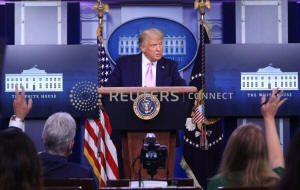|
"I
don't know much about the movement, other than I understand they
like me very much," Trump told reporters at a briefing.
"These are people that don't like seeing what's going on in
places like Portland, in places like Chicago and New York, and
other cities and states," he added, referring to anti-racism
protests that have taken place across the country over the death
of George Floyd, a Black man, in police custody in May.
QAnon followers espouse an intertwined series of beliefs based
on anonymous web postings from someone claiming special insider
knowledge of the Trump administration. The core tenet is that
Trump is secretly fighting a cabal of child-sex predators
including prominent Democrats.
A spokesman for Democrat Joe Biden, Trump's opponent in the Nov.
3 election, said the Republican president was "again giving
voice to violence."
"After calling neo-Nazis and white supremacists in
Charlottesville 'fine people' and tear gassing peaceful
protesters following the murder of George Floyd, Donald Trump
just sought to legitimize a conspiracy theory that the FBI has
identified as a domestic terrorism threat," Biden campaign
spokesman Andrew Bates said in a statement.
On Wednesday, Facebook said it had removed nearly 800 QAnon
conspiracy groups for posts celebrating violence, showing intent
to use weapons, or attracting followers with patterns of violent
behavior.
(Reporting by Andrea Shalal and Eric Beech; Additional reporting
by Trevor Hunnicutt; Writing by Alexandra Alper; Editing by
Sonya Hepinstall and Christopher Cushing)
[© 2020 Thomson Reuters. All rights
reserved.] Copyright 2020 Reuters. All rights reserved. This material may not be published,
broadcast, rewritten or redistributed.
Thompson Reuters is solely responsible for this content.

|
|






